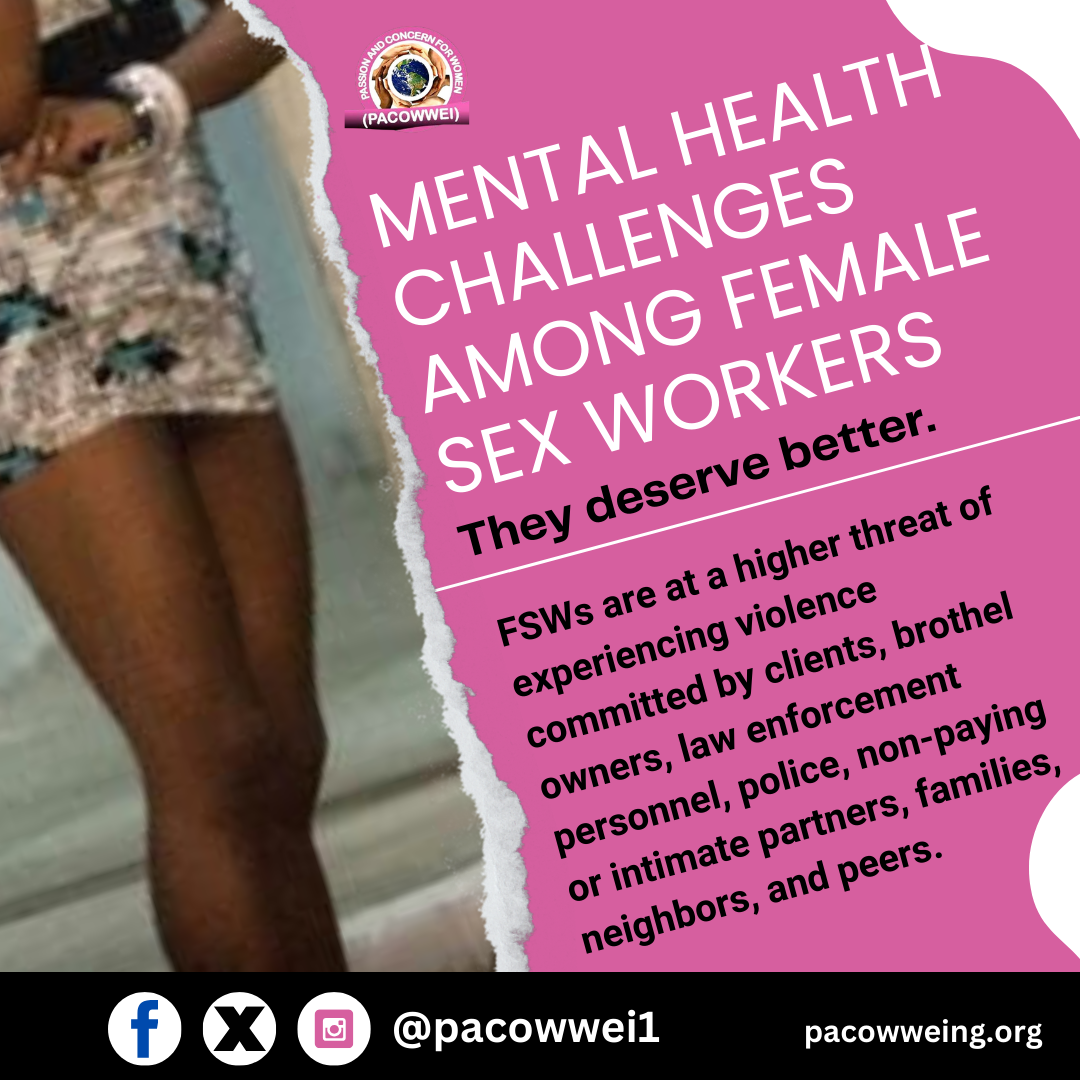Female sex workers (FSWs) are referred to as women who consensually exchange sexual intercourse for money or other goods, as a livelihood activity. FSWs are at a higher threat of experiencing violence committed by clients, brothel owners, law enforcement personnel, police, non-paying or intimate partners, families, neighbors, and peers.
Traumatic experiences can lead to post-traumatic stress disorder (PTSD), anxiety, depression, and other mental health disorders. Additionally, the constant need to negotiate boundaries, handle difficult clients, and navigate potentially dangerous situations can create chronic stress and exacerbate mental health challenges. As a result, FSWs have a very high propensity for suicidal thoughts, suicide attempts, and other mental disorders. Therefore, it is essential to consider their voices and perspectives when discussing policies, programs, and interventions aimed at supporting their mental health and well-being.
Defining female sex workers (FSWs) is not easy because many are trafficked or coerced into the sex industry. Those under the age of legal sexual consent cannot be referred to as FSWs because they are vulnerable children who are being sexually exploited and abused. Female sex workers are referred to as women who consensually exchange sexual services for money or other goods, as a livelihood activity, albeit within a high-risk environment characterized by criminalization, poverty, homelessness, drug dependency, providing income for relatives, and lack of education, where their options for earning a livelihood may be quite limited within the environment.
According to the International Labor Office, FSWs are at a higher threat of experiencing violence committed by clients, brothel owners, law enforcement personnel, police, non-paying or intimate partners, families, neighbors, and peers.
The continued efforts of politicians, police, and resident groups to eliminate street prostitution from residential areas contributed to a substantial rise in street prostitute murders in British Columbia.
Gender-based violence among street-based female sex workers was significantly affected by age, education, monthly income, fee negotiation, client load, and consistent condom use.
The violence can have severe implications for the mental health of FSWs. Traumatic experiences can lead to post-traumatic stress disorder (PTSD), anxiety, depression, and other mental health disorders.
Additionally, the constant need to negotiate boundaries, handle difficult clients, and navigate potentially dangerous situations can create chronic stress and exacerbate mental health challenges. In terms of stigma, specifically referring to “whore stigma” or sex work stigma, may refer to worldwide studies in this field in regard to the argument for decriminalization, as well as health and criminalization.
Societal judgment, negative stereotypes, and the criminalization of sex work can lead to feelings of shame, guilt, and self-doubt. This stigma can contribute to social isolation, reduced access to support networks, and limited opportunities for seeking help. As a result, FSWs have a very high propensity for suicidal thoughts, suicide attempts, and other mental disorders.
Moreover, substance use is a common coping mechanism among some sex workers, as it can temporarily alleviate emotional pain, reduce inhibitions, or help manage the challenges of their work.
However, substance abuse can lead to addiction and further compromise mental health, exacerbating pre-existing conditions or triggering new ones. FSWs often face limited access to healthcare, including mental health services. Due to the illegal nature of their work in many jurisdictions, they may be reluctant to seek support or fear discrimination from healthcare providers.
This lack of appropriate resources can hinder their ability to address mental health concerns and contribute to a cycle of vulnerability and isolation.
Despite the numerous challenges, it is crucial to acknowledge the resilience and agency of female sex workers. Many individuals develop coping strategies, support networks, and personal strengths that help them navigate the complexities of their lives.
It is essential to consider their voices and perspectives when discussing policies, programs, and interventions aimed at supporting their mental health and well-being. Addressing the mental health needs of female sex workers requires a comprehensive approach that involves destigmatization, decriminalization, and improved access to healthcare and social support.
Creating safe spaces, non-judgmental environments, and tailored services can play a crucial role in promoting the well-being and mental health of this population. It is vital to respect their autonomy, human rights, and individual experiences while working towards policies that prioritize their safety and overall welfare.



